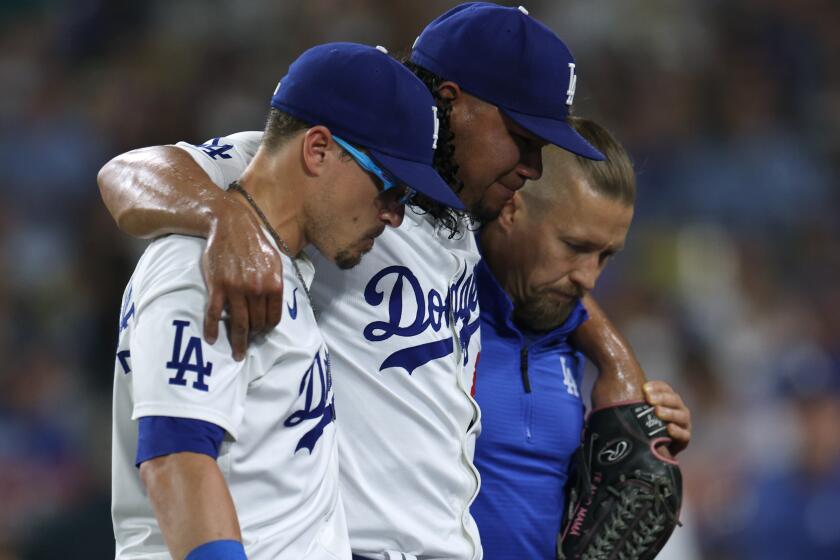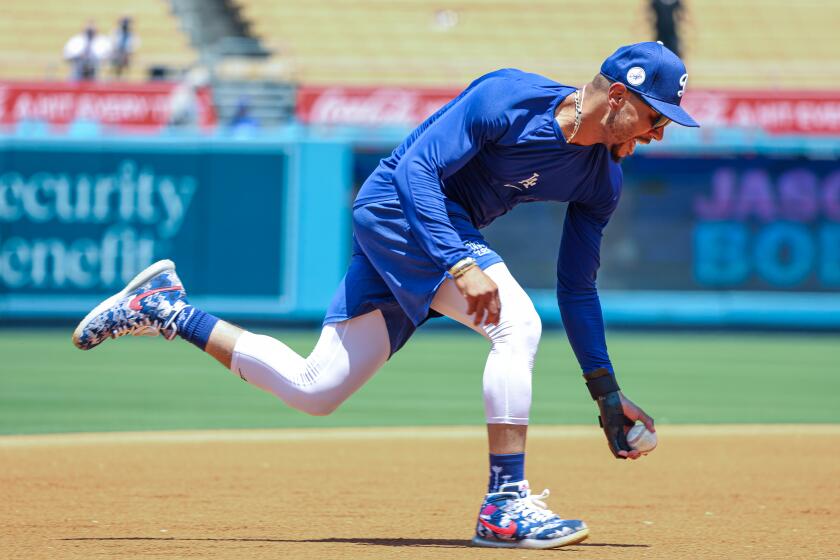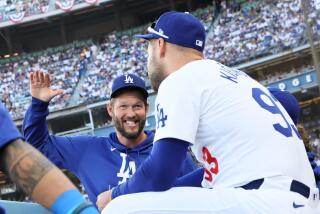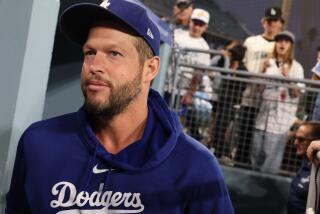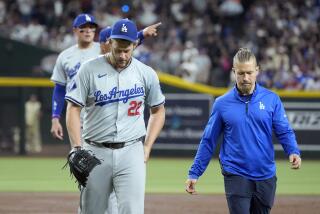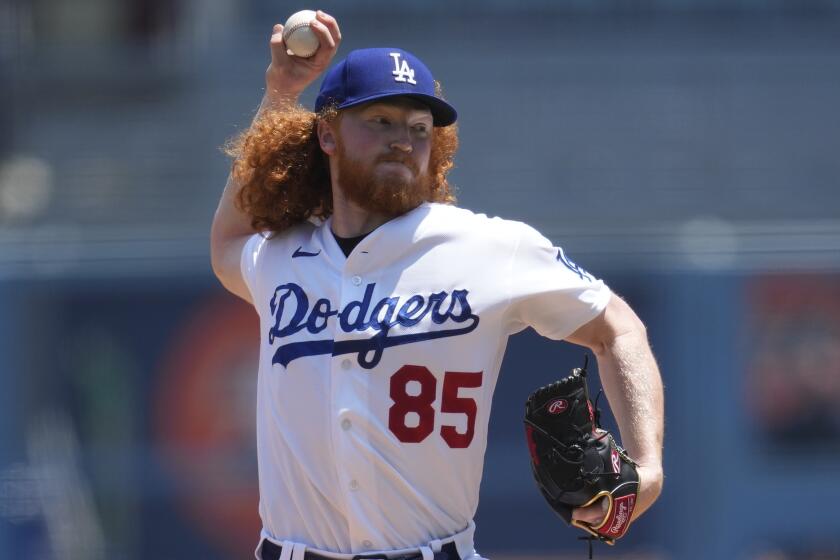Column: The Dodgers are back to asking a lot of Clayton Kershaw, because they have no choice
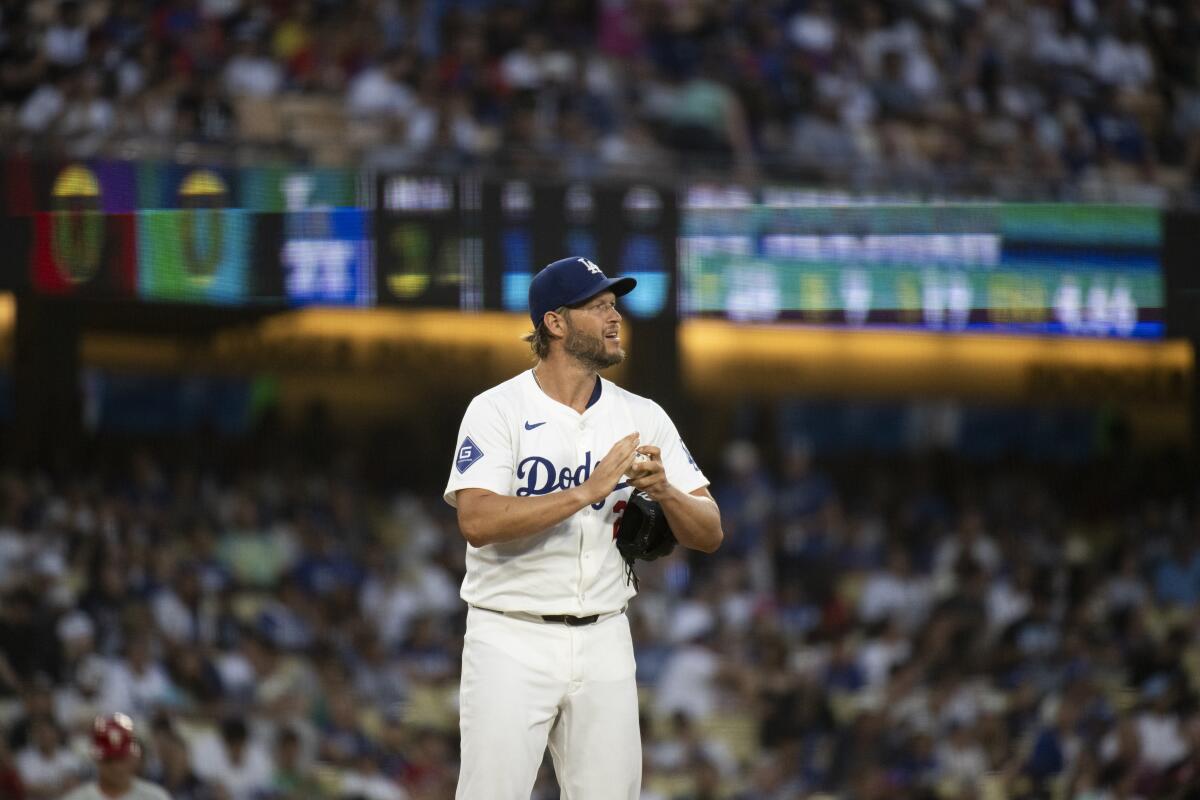
The game was only Clayton Kershaw’s third of the season.
Dodgers manager Dave Roberts stressed that point on Tuesday night when revisiting his decision to take out Kershaw in the fifth inning of a promising start against the Philadelphia Phillies.
“It’s about continuing to build up, so then he has a base and a foundation to keep going,” Roberts said. “So, right now, for me, it was an easy one.”
The key words: Right now.
By the time Kershaw takes his next turn in the rotation, the Dodgers might not have the luxury of removing him at the first sign of trouble. By the time they’re in the playoffs, they almost certainly won’t be able to manage him as cautiously as they would a rookie.
Clayton Kershaw rebounded from a bad outing, but reliever Brusdar Graterol severely injured his hamstring as the Dodgers lost to the Phillies.
Even after a billion-dollar offseason and the acquisition of the best pitcher who was moved at the trade deadline, the Dodgers are back to where they usually are at this time of the year.
They’re back to depending on Clayton Kershaw.
They might not like the idea of staking their season on a 36-year-old who underwent a major shoulder operation over the winter, but their situation leaves them no other choice. In the wake of their 6-2 loss to the Phillies in the second game of their three-game series at Dodger Stadium, their lead over the San Diego Padres in the National League West was down to four games.
Their injury-prone rotation has predictably unraveled, and Kershaw might have to pitch effectively for the Dodgers to have a realistic chance of winning the World Series. Tyler Glasnow and Jack Flaherty will lead their staff for the remainder of the regular season and beyond, but whom do they have behind them? Three starting pitchers will likely be required in the National League Division Series, four in the two series after that.
Yoshinobu Yamamoto has been sidelined for close to two months with a shoulder injury and isn’t expected to return until September. Gavin Stone looks as if he’s wearing down. Walker Buehler aborted his initial attempt to come back from his latest elbow reconstruction. Bobby Miller isn’t even in the major leagues. River Ryan has made only three career starts.
What the Dodgers ask of Kershaw could also be affected by the state of the bullpen. Evan Phillips’ loss of form last month has left the Dodgers without a closer. Brusdar Graterol’s return from a shoulder injury lasted only eight pitches, as Graterol went down with a severe hamstring strain that is expected to end his season. The shortage of bullpen resources has been magnified by the inability of the starters to pitch deep into games. Dodgers starters have registered a combined 577⅔ innings, fifth fewest in the NL.
In other words, the next time Kershaw is in the kind of jam he was in the fifth inning against the Phillies, Roberts might not have a viable arm to replace him. The manager’s only choice might be to have him pitch through it.
Six days after a nightmare start in San Diego in which he lasted only 3⅔ innings and looked finished, Kershaw was a new pitcher on Tuesday. His fastball remained in the low-90s, but he controlled the pitch better and threw a greater number of curveballs, which helped him limit the NL’s top team to one run over 4⅔ innings.
“This guy is the greatest competitor I’ve ever been around,” Roberts said. “He just kind of willed himself to have a quality outing.”
The Phillies had runners on the corners with one out in the fourth inning, but Kershaw escaped by striking out Alec Bohm and forcing J.T. Realmuto to ground out. There was more trouble in the fifth inning when Austin Hays doubled and Brandon Marsh was hit by a pitch. Kershaw finished a nine-pitch at-bat by the persistent Edmundo Sosa with a strikeout, only to give up a run-scoring single to Kyle Schwarber that moved the Phillies in front, 1-0.
There were two outs, but the Phillies had runners on the corners. Up next was a right-handed-hitting All-Star, Trea Turner, who was about to face Kershaw for the third time. Roberts came for Kershaw and replaced him with Joe Kelly, who made Turner line out to center field. The Phillies blew open the game by scoring three runs in the sixth inning.
“You never want to come out of the game, obviously,” said Kershaw, who threw 81 pitches.
When Mookie Betts makes his long-awaited return from a left hand fracture in Milwaukee next week, it will be in one position that has become relatively familiar to the eight-time All-Star and another that will be relatively new.
Kershaw didn’t direct any frustration at Roberts, however. Rather, he blamed himself for his early departure, mentioning the two hitters who reached base after he backed them into 0-2 counts.
“Just made some dumb mistakes,” Kershaw said. “I just have to figure out how to maintain my pitch count. Obviously, my pitch count will keep getting higher, but you have to figure out how to get through at least five [innings], six or seven at some point.”
Roberts said of how Kershaw was focused on what he could control: “That’s the thing I respect.”
This mindset explains why Kershaw has a chance to be a difference maker when his pitches aren’t as explosive as they used to be. Provided he makes the improvements he wants to make, the Dodgers have an obligation to explore the limits of this version of Kershaw. They owe it not only to him but to the other players as well. To win, they’ll need him.
More to Read
Are you a true-blue fan?
Get our Dodgers Dugout newsletter for insights, news and much more.
You may occasionally receive promotional content from the Los Angeles Times.

